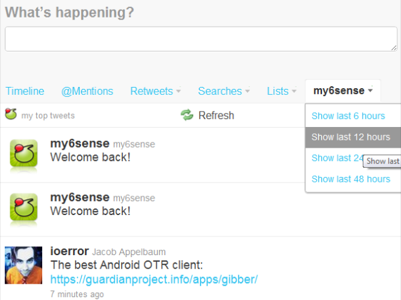
My6Sense, the personalized recommendation engine for both iOS and Android, comes to the desktop today with a Chrome extension that brings the my6sense experience to Twitter.com. What exactly is the my6sense experience? my6sense uses what it calls “digital intuition” to determine what parts of your stream, whether Twitter, Facebook, Google Buzz or RSS feed, are most relevant to your interests.
We met up with Louis Gray and my6sense CEO Barak Hachamov last month to take a tour of the new product and discuss the company’s plans for personalizing the Web.
Gray, a Silicon Valley blogger and startup consultant who joined the company as VP of marketing last August, set the stage for the company’s new service when we spoke to him.
“You should be able to go somewhere like CNN.com,” said Gray, “and have it sorted according to you.”
This is the long and short of my6sense’s vision of the Web – a personalized version of the Web for each person, based on how you interact with content. And the company’s latest product – the Chrome extension – takes the first leap off the mobile phone and into users’ browsers.
“We have a bigger dream of bringing digital intuition everywhere,” explained Gray. “The first step is attacking the noise right in your browser.”
my6sense’s Chrome extension does just that. It adds a my6sense button to your Twitter page, which allows you to view your Twitter stream on the Twitter website as personalized by the my6sense engine. Once the extension is installed and running, it can filter your Twitter stream for the most relevant content from the past six, 12, 24 or 48 hours.

As ReadWriteWeb’s Marshall Kirkpatrick noted when he placed my6sense on his “Top 10 RSS and Syndication Technologies of 2010“, a key factor for the company is that it is “focusing on monetizing a commercial API” and “that’s a good business to be in.” Now, the company appears to be playing that angle by showing how its “digital intuition” engine can be applied as another, personalized layer directly in the browser.
As my6sense CEO Barak Hachamov explained, “the amount of information that will compete for our attention in the future will increase by 10x.” This, he said, was just the first step.
First Twitter. Next? The Web.





















